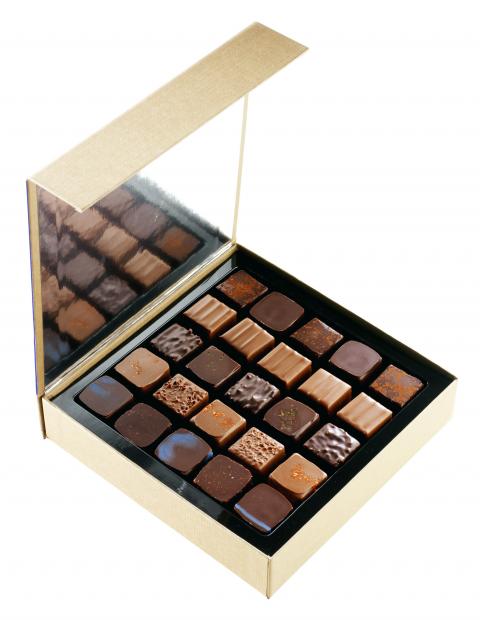Taipei is no stranger to high-end chocolate, and the arrival of Jean-Paul Hevin’s first Taiwan outlet looks set to lift the bar even higher. Hevin has a huge reputation in the worlds of chocolate and patisserie, having won multiple French awards for his artistry. He now has seven outlets in Japan, and in 2005 was ranked by the Nikkei Shimbun as the top chocolate maker in Japan.
The two shops in Taiwan — one sells a wide range of chocolates and the other is a cafe space serving specialty teas and Hevin’s famous hot chocolate drinks — are located on the ground floor of the Formosa Regent Hotel and are currently still finding their feet.
The Jean-Paul Hevin brand is very much about luxury and exclusivity. Shelly Yang (楊佳樺), the marketing manager, emphasized that all the chocolates are flown out from Paris, and virtually everything in the outlet is imported from Europe. What you get in Taipei is exactly what you would in Paris, and this insistence on authenticity and the associated price may appeal to some, but could be a tad ostentatious for others. After all, a single macaroon costs NT$138 and a cup of Hevin’s flavored hot chocolate is NT$350. Many high-end patisseries in Taipei have sought to cash in on the huge revival of the difficult-to-perfect delicacy of macaroons, and it must be said that Hevin’s rank among the very best. Hevin is as reliable with traditional versions as he is with his own playful variations. The macaron frambois, with its delightful pink biscuit and its rich chocolate and raspberry garnish, is perfectly delicious, but bold innovations such as the creme brulee or the passion fruit macaroon really get the palate tingling.

Photo Courtesy of Leading Lady Fashion Co
According to Yang, only a limited range of products is currently on offer, and the outlet is focusing on a number of key items to draw in customers. The made-to-order range of hot chocolate drinks is particularly popular. Although guests might choose exotic concoctions such as hot chocolate with matcha (Japanese green tea powder), or flavored with raspberry mousse, the original unadorned drink is the real winner. It is thick, creamy and full of depth, but given its price, I felt there should be a little more sense of occasion in the drink’s preparation and presentation.
Despite the expensive brown leather chairs imported from Italy and beautiful tiled bar with its comfortable bar stools in the cafe area, the space lacks a sense of theater.
The fact that the cafe is separate from the “cave” — the cooled vault were the bonbons and individual chocolates are sold — might have something to do with this, for there is no display to tempt guests as they lounge. Yang explained that the chocolate shop is cooled to between 16°C and 19°C to provide the best environment for the chocolate, and while this might be a perfectly satisfactory explanation on a technical front, it might be less than ideal for many customers.
Though the atmosphere is somewhat compromised, the sweets are likely to have any chocoholic’s mouth watering. Individual chocolates retail from NT$100 a piece. Hevin has his own range of teas, and a pot (from NT$250) is an ideal accompaniment to a selection of chocolates, carefully served at the ideal temperature to ensure the best texture. Yang said that the outlet would be adding to its range of offerings, including sandwiches and other non-chocolate snacks, over the coming months.

June 9 to June 15 A photo of two men riding trendy high-wheel Penny-Farthing bicycles past a Qing Dynasty gate aptly captures the essence of Taipei in 1897 — a newly colonized city on the cusp of great change. The Japanese began making significant modifications to the cityscape in 1899, tearing down Qing-era structures, widening boulevards and installing Western-style infrastructure and buildings. The photographer, Minosuke Imamura, only spent a year in Taiwan as a cartographer for the governor-general’s office, but he left behind a treasure trove of 130 images showing life at the onset of Japanese rule, spanning July 1897 to

One of the most important gripes that Taiwanese have about the Democratic Progressive Party (DPP) is that it has failed to deliver concretely on higher wages, housing prices and other bread-and-butter issues. The parallel complaint is that the DPP cares only about glamor issues, such as removing markers of Chinese Nationalist Party (KMT) colonialism by renaming them, or what the KMT codes as “de-Sinification.” Once again, as a critical election looms, the DPP is presenting evidence for that charge. The KMT was quick to jump on the recent proposal of the Ministry of the Interior (MOI) to rename roads that symbolize

In an interview posted online by United Daily News (UDN) on May 26, current Chinese Nationalist Party (KMT) Chairman Eric Chu (朱立倫) was asked about Taichung Mayor Lu Shiow-yen (盧秀燕) replacing him as party chair. Though not yet officially running, by the customs of Taiwan politics, Lu has been signalling she is both running for party chair and to be the party’s 2028 presidential candidate. She told an international media outlet that she was considering a run. She also gave a speech in Keelung on national priorities and foreign affairs. For details, see the May 23 edition of this column,

On the evening of June 1, Control Yuan Secretary-General Lee Chun-yi (李俊俋) apologized and resigned in disgrace. His crime was instructing his driver to use a Control Yuan vehicle to transport his dog to a pet grooming salon. The Control Yuan is the government branch that investigates, audits and impeaches government officials for, among other things, misuse of government funds, so his misuse of a government vehicle was highly inappropriate. If this story were told to anyone living in the golden era of swaggering gangsters, flashy nouveau riche businessmen, and corrupt “black gold” politics of the 1980s and 1990s, they would have laughed.